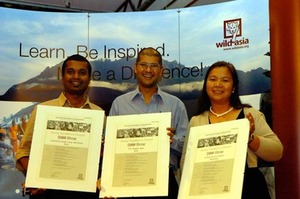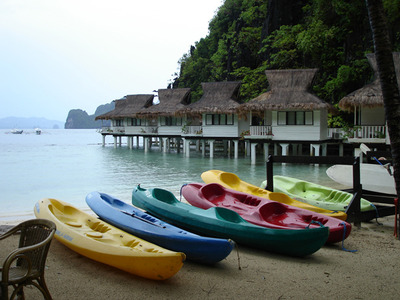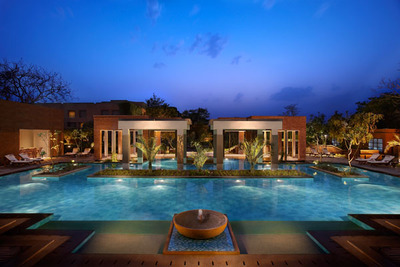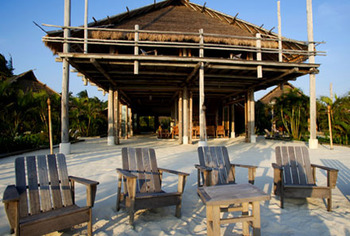This year's finalists demonstrated sustainable tourism beyond "green checklists", and the winners are: Sunderbans Jungle Camp, ITC Mughal and El Nido Resorts.
By Mallika Naguran

(from left) Gopinath Parayil represents The Sunderbans, Dr Reza Azmi represents ITC Mughal in receiving the award. Far right, triumphant Mariglo Laririt of El Nido Resort.
Kuala Lumpur, 28 October 2009. For the fourth year running, Wild Asia held its Responsible Tourism Award that sought to recognise and reward exemplary travel operators that stood out from the rest – the eco way. Three winners emerged from eight finalists, from six Asian countries.
The event, held at Hotel Istana in Kuala Lumpur on 28 October 2009, saw around 80 people attending, a number of them hoteliers and resort operators shortlisted as finalists. There were also other hoteliers there, hoping to learn from the finalists on environment management, a big part of which is learning to live harmoniously with communities of the area.
And that is no easy task. The Sunderbans Jungle Camp (Bali island, India) had taken great pains the “resolve human and nature in conflict”, said Gopinath Parayil of The Blue Yonder, a travel partner of the property. The Sunderbans were winners in the Community-based to Homestay Operators category.
They exemplified how social entrepreneurship can be the driver of change, turning hunters to conservationists. In particular, poachers of the endangered Bengal tigers were persuaded to leave their guns behind to take on conservation, which then leads to a new revenue source – eco tourism.

Saving the Bengal tiger from poachers was a crucial part of the Sunderbans Jungle Camp's mission.
Finalists in this category were Andaman Discoveries, Phang Nga Province of Thailand and Lamai Homestay, Khorat also of Thailand. They received a certificate on stage for their efforts.

Partnerships make El Nido's eco operations tick.
The winner of the Mid-sized to Small Accommodation Operators category was El Nido Resorts. The victory was not a singular effort by the luxury class property located in Palawan of the Philippines. “Responsible tourism is all about partnerships,” beamed a jubilant Mariglo Laririt, the Environmental Manager of the resort. She explained that the resort had over the years worked in close collaboration with all sectors such as shareholders, NGOs, the government and the people living in the area to achieve their environmental objectives.
The shortlisted finalists in the same category were Nikoi Island, Bintan of Indonesia and Soneva Fushi, Kunfunadhoo of the Maldives.
Bagging the Large Accommodation Operators category was ITC Mughal, Agra of India, leaving a clearly disappointed Shangri-La Tanjung Aru Resort & Spa, Sabah as its close contender. Dr Reza Azmi, founder of Wild Asia and organiser of the awards, reflected on the importance of a strong management in drilling down environmental principles to infiltrate all staff.
Shangri-la itself has for many years initiated a number of community-based activities to institute waste reduction, recycling (plastic raft event) and others.
“Never to settle for business-as-usual, these operators are committed to improving the way they do things, i.e. from raising awareness to learning and capacity building; periodic monitoring of performance objectives and seeking innovative solutions for continued improvement; and building partnerships with like-minded organisations to develop holistic strategies in meeting the requirements of responsible tourism,” said Reza.
Judging Criteria
What criteria were used in evaluating responsible tourism, and in selecting the winners?
First, the process involved self-evaluation checklist submissions followed by site verification visits by judges and fact-finders to all finalists’ destinations.

ITC Mughal in India pampers guests lavishly while being committed to the environment.
There were forty criteria in the checklist, covering aspects of local employment and economies; respecting local laws, cultures and sensitivities; responsibilities towards employees and communities; recognising the children’s rights; and protecting the environment through a suite of conservation initiatives, efficient use of resources, as well as responsible waste management.
In spite of being guided by the checklist, Reza explained that they also considered broader and finer aspects. “Today, after more than a decade of thought and dialog with tourism operators, we now believe that we need to move away from simply ticking off green practices,” he said. He singled out these few attributes:
Intentions. “For some operators, intentions we found were far more important than the actions,” he said, adding that “confidence” also played a part.
Internalisation. Where management systems filter down to the lowest level so that the entire property acts in tandem with its environmental goals. “Understanding and internalising the essence of responsible tourism, these operators are catalysts for positive change within their sphere of influence, inspiring others to embark on the green journey while at the same time, still affording customers with the memorable holiday experience the travel for in the first place,” said Reza.
Sustainability. This relates to having financial viability in keeping the responsible tourism operations going.
Sphere of Influence. In other words, not operating in isolation. “We were finding bright sparks, filling up the map of hope, which is encouraging,” he said.
One of the judges was architect Ian Hall based in Sabah who supports conservation of wildlife in particular sunbears (which surprisingly exist in Borneo but dwindling rapidly mainly due to deforestation).
Ian shared with me instances where judges found it difficult to arrive at a decision in picking the winners. While a certain amount of objectivity went into the assessment criteria, subjectivity also played a part in hammering out inclinations based on observations and fact, which then sway the decision making process.

Nikoi Island harnesses natural elements like driftwood and solar power.
Sphere of influence was a key component of the judging criteria, he said, where responsible tourism operators had to not just be seen to be eco friendly on their premises, but also extending the message and becoming inspirational icons in the communities in which they operate. “This was one reason why Nikoi Island didn’t top the charts, in spite of its incredible achievement of building a property that minimizes its impact on the environment, for example creating aesthetically pleasing island huts constructed from driftwood and having solar-powered water heaters,” said Ian. "But they are new. Give them a few more years, and if they continue with what they are doing, I'm sure they'll bag the award," he added.
For the Community-based to Homestay category, the panel of judges had an interesting time assessing the shortlisted participants. Each property had a similar trait with having close links with NGOs. While the Thailand properties relied on NGO support to keep their community-based tourism activities going, the Sunderbans of India did the direct opposite. “The Sunderbans were contributing to the NGOs instead, and that seemed to us a clear winner,” smiled Ian.
Perhaps Reza sums up the real criterion that throbs at the heart of Wild Asia’s Responsible Tourism Award. “What we now look for are operators that we can trust; have the best of intentions; that can demonstrate they understand their local issues and have people in place that can sustain their efforts.”
Gaia Discovery congratulates all finalists for their winning, inspiring efforts and commitment in saving Gaia while running for-profit businesses. We bring you the links to show you their responsible actions in editorial and videos, hoping that you will be persuaded to stay at these eco resorts during your next vacation.
Large to Mid-size Accommodation Operators
Shangri-La Tanjung Aru Resort and Spa, Malaysia
Mid-size to Small Accomodation Operators
Community-Based to Homestay Operators
About Wild Asia:
Wild Asia is a social enterprise working to support the conservation of natural areas and the communities dependent upon their resources. About Wild Asia, the RT Awards and Responsible Tourism Program contact RT@wildasia.orgor visit http://www.wildasia.org/main.cfm/RT/RT09_Event
RTA 2009: ITC Mughal, India.
RTA 2009: Sundarban's Jungle Camp, India.
RTA 2009: El Nido, Palawan, Philippines